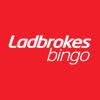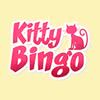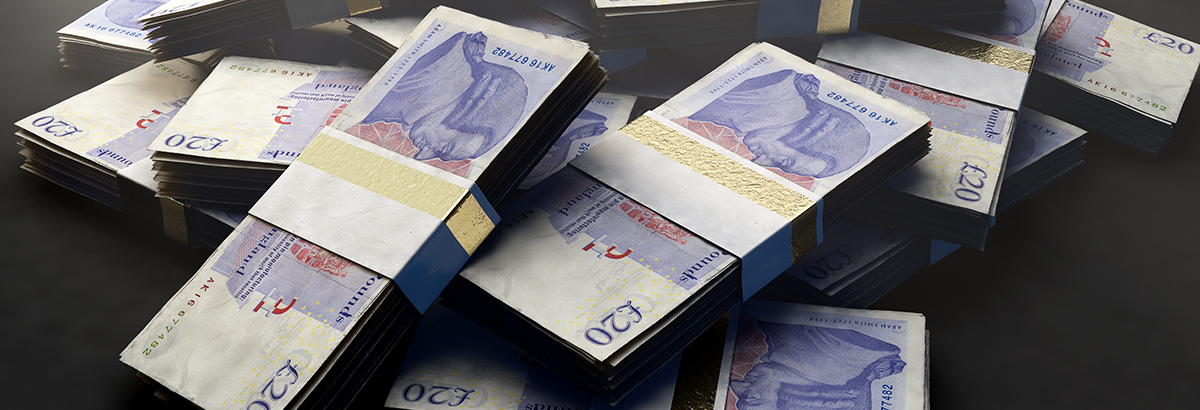
Can You Really Win a Million Pounds Playing Bingo?

-
Updated: 27th Jul 2022
For Christmas 2016, Virtue Fusion ran arguably the biggest bingo promotion ever, a million pound bingo game. In this 90 ball game, the full house prize was £500,000, the prize for two lines was £200,000 and the prize for one line was £100,000. The remaining £200,000 was split between 1TG/2TG cards (£100,000) and all non winning cards (£100,000). With a ticket price of £2, this game offered the opportunity to win hundreds of thousands of pounds (but not the entire million) and in the event the full house prize was shared making 2 lucky players £250,000 richer each.
But is it possible that someone might win a whole million pounds on a bingo game?
The notion of winning a million pounds on bingo is not a new one – many bingo sites are either currently advertising million pound prizes for bingo games or have done so in the past. But is it REALLY possible to win a million pounds playing online bingo?
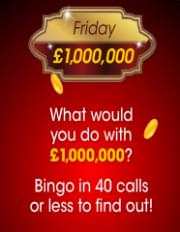

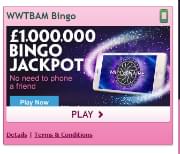
- Historical Big Bingo Wins
- Online Bingo – Big Prizes
- Progressive and Room Jackpots – How They Work
- Sliding Jackpots – How They Work
- Ridiculously Improbable
- 75 Ball Improbabilities
- When It Is Impossible To Win
- Silly Numbers Of Bingo Cards
- 90 Ball Improbabilities
- How Many Cards In A Real Bingo Game?
- Guess The PIN Number
- When Ticket Sales Do Not Determine Prizes
- Sliding Jackpots – Crunching The Numbers
- A Rip-Off Or Not?
- The Million Pound Bingo Prizes
- The Lotto Alternative
- The Virtue Fusion Million Pound Game
- Bingo Millions
- Can You Really Win A Million Playing Bingo?
Historical Big Bingo Wins
There have indeed been a number of occasions (back in 2008) when players won more than a million pounds on a bingo game; in all cases this was as a result of winning the platinum jackpot on the National Bingo Game before the rules were changed. The National Bingo Game is NOT an online game – it is a linked bingo game played simultaneously in a large number of bingo halls across the country. Nor would it be possible for a player to win that much now – at the time this article was originally written the maximum jackpot was £250,000 and in April 2018 the rules were changed again making the maximum jackpot a mere £50,000.
Online Bingo – Big Prizes
While there have been a number of reported cases of players at online bingo sites winning multi million pound sums – most notably the £5.8 million won at Butlers Bingo in December 2012 – these have all been as a result of playing progressive jackpot slots and NOT actual bingo. The biggest reported win from an online bingo game was at Jackpot Joy, also in 2012, when someone scooped a £510K progressive jackpot by winning Bejeweled Bingo (90 ball) in 38 calls, and for this record to be broken by the Virtue Fusion £1M game, the full house would have to have been won by one person only and they would also need to have won at least one of the line prizes.
Until Christmas 2016 and the £1M game, the biggest guaranteed prize that could be won in an online bingo game was much smaller than that. Virtue Fusion and 888 had both run network promotions involving massively linked games with a full house prize of £50,000 and while larger sums than this were advertised from time to time they would invariably turn out to be either the total of all three prizes in a 90 ball game, the total of the prizes to be won over an evening or a weekend, or – most commonly – a progressive, room or sliding jackpot which will only be paid out if someone wins bingo in a specified number of calls or fewer.
Progressive and Room Jackpots – How They Work
Progressive and room jackpots can apply to specified bingo games, to all bingo games in one room or sitewide. The jackpot is paid out when someone wins a bingo game in the specified number of calls or fewer. Room jackpots can be a fixed amount or can be progressive. Progressive jackpots are funded by a levy on ticket sales and continue to grow with each game in which the jackpot is not won. The lower the number of required calls, the less frequently the jackpot will be triggered – and often it can be months or even years before it drops.
An escalator jackpot is a modification of a room or progressive jackpot, in which the number of calls required to win is increased at pre-announced intervals (once a day, or once an hour over the course of an evening) until someone wins.
One important fact to note about a progressive jackpot is that it is a real amount of money that WILL eventually be won by someone (even if it takes years). This is NOT the case with a sliding jackpot.
Sliding Jackpots – How They Work
In a sliding jackpot game, the list of prizes that could be won is published beforehand and does not bear any relation to the ticket sales; the prize is determined by the number of balls it takes for bingo to be called. For example, the Dragonfish network ran a sliding jackpot game three times a week in which the top prize was a million pounds and this would be won if bingo were to be reached in 24-40 calls. After 40 calls the prize decremented with each ball and at 50 calls, it was all the way down to £5000. The prize continued to go down after that (with slight differences between the three games) until 54 calls where it reached the guaranteed amount (which was £1000 for the Wednesday game, £1500 for the Friday game and £500 for the Saturday game – 1000 x ticket price in each case) and this is what was paid out, regardless of ticket sales, if 54 or more balls had come into play when bingo was called. Dragonfish had a published list of winners going back around 5 years, and this revealed that more often than not, the payout was indeed £1000, £1500 or £500; the only really sizeable recorded wins were £35,000 in June 2015 when someone completed the coverall in 45 calls, and £75,000 in July 2016 for a coverall in 44 calls.
Another example of a sliding jackpot was this regular game that was exclusive to Circus Bingo. Here, the headline prize required bingo in 41 or fewer calls and reached the floor of the guaranteed amount at 49 calls :

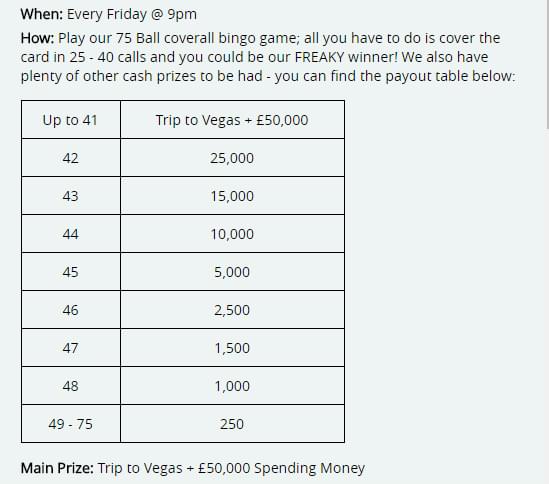
Bingo site operators love sliding jackpot games because they get to advertise a huge prize which (as we will see) they almost certainly won’t actually have to pay out and many players love them too, because the headline prizes sound so enticing. What those players fail to realise is that as the ball count goes down the probability of bingo being called in that number of balls drops off very rapidly indeed and in the vast majority of such games the probability of anyone ever actually winning the headline prize is ludicrously, vanishingly tiny.
Ridiculously Improbable
There’s improbable, there’s very improbable, and there’s REALLY improbable. Most people would consider flipping a coin ten times in a row and getting heads every time to be pretty unlikely – and it is, at 1 in 1024. Stepping it up an order of magnitude, most people would consider guessing a 4 digit PIN number and getting it right on the first attempt to be extremely unlikely – and again, at 1 in 10,000 it is. For the realms of REALLY unlikely a couple of obvious contenders are a UK Lotto win at 1 in 45 million, and the chance an average person in the UK has of being killed by lightning within the next year at 1 in 32.5 million – but it turns out that, when we come to consider the truly tiny probabilities associated with sliding jackpot bingo games those are not even in the right ballpark.
Suppose you tried to guess David Beckham’s mobile phone number by dialling 07 followed by 9 random digits. What do you think your chances would be of getting through to him first time? The answer is one in a billion – as there are a billion different 9 digit permutations ranging from 000000000 to 999999999. Surely this must be much more unlikely than winning one of the big bingo jackpots?
….but you can guess what’s coming, can’t you?
In 75 ball coverall, you have to match 24 numbers out of 75…so less than a third of the numbers. You might think you have a reasonable chance of matching your 24 numbers when more than half of the 75 numbers have been called…after 38 calls, right? The chance of doing that with one card is actually a shockingly bad 1 in 2.6 billion…and it gets worse!
75 Ball Improbabilities
Quite a while back a man called Bill Butler (aka Durango Bill) wrote a computer program to do a statistical analysis of the number of calls in which bingo is reached in a 75 ball coverall game and this reveals just how unbelievably tiny the probabilities are for low numbers of calls. Buy one card for a 75 ball coverall game and your chance of getting a coverall in 40 calls or fewer is approximately 1 in 410 million. You only need to be allowed three attempts at guessing David Beckham’s phone number to have a better chance of doing that!
That’s for the 40 calls in the Dragonfish network sliding jackpots, but some of these games require bingo in considerably fewer calls than that to pay out the headline amount – such as a ridiculously improbable 29 calls and in one case 24 calls, which is so fantastically improbable as to be beyond ridiculous; the chance of your winning this if you buy one card to the game is one in 25.6 quintillion – which is more than ten thousand times less likely than winning the UK Lotto jackpot twice in one week. To look at it another way, 25.6 quintillion seconds is approximately 820 billion years which is around 60 times the estimated current age of the universe.
When It Is Impossible To Win
The more cards in play in a game, the more likely it becomes that a coverall will be achieved sooner rather than later – but another thing to understand about sliding jackpots is that because of the rules governing how numbers are laid out on bingo cards the majority of bingo games are actually impossible to win in a low number of calls irrespective of how many cards are in play. For there to be ANY possibility of bingo being won in 24 calls in 75 ball, the first 24 balls to be called MUST be made up out of 5 in the range 1-15, 5 in the range 16-30, 4 in the range 31-45, 5 in the range 46-60 and 5 in the range 61-75. Clearly this is only going to happen in a very small subset of 75 ball bingo games (0.43%) – and if it does not happen it does not matter how many cards are in play because there is no possible bingo card that could win in 24 calls.
It is only when 32 of the 75 balls have been called that the probability of the game being one that it is impossible to win dips below 50% – and just under 9% of all 75 ball bingo games will be impossible to win in the 40 calls required for the Dragonfish million even if there are enough cards in play to include every single one of the 36,965,675,601,855 combinations of 24 numbers that can legally appear on a 75 ball card.
Because of this, there is NO number of cards, however large, that could be sold to ANY sliding jackpot game currently (or historically) run ANYWHERE that would guarantee that someone would win the headline prize. The highest number of calls for the headline prize in any regularly run sliding jackpot game is 47 in the (now defunct) Daily Thousand game at Gossip Bingo and sister sites, whereas the number of calls within which 100% of games are possible to win is right up at 65 – as 64 is the highest number of calls which could include only 4 numbers from one of the four columns that require 5 daubs (All 15 numbers from each of the other 4 columns, plus 4) making it impossible for any card to be complete.
Silly Numbers Of Bingo Cards
As an entertaining digression we can consider the practical problems of a 75 ball bingo game with all possible sets of numbers in play (assuming you could get exactly the right set of 36,965,675,601,855 cards with no duplicate number combinations). If they are real cards printed on normal paper, the first hurdles to be overcome are the 57 million trees that need to be processed into paper and the 9.5 billion ink cartridges that would be used. Once printed out (which, at one sheet per second and 8 cards per sheet, would take around 145,000 years), if you pile them one on top of another the stack would reach almost 10 times the distance to the moon. If they are online, each card occupies 12 bytes so the game would use up approximately 443 terabytes of memory – roughly equivalent to the volume of data that goes through Facebook in 24 hours. Actually playing the game would be a bit of a problem as well. With real cards, the entire population of the earth would have to play in the region of 5000 cards each. In the case of an online game, while it would be technologically feasible to check all the cards after each draw in under a second, it would require a dedicated computer system with a million super-fast solid state drives each with its own CPU and the retail cost of just the equipment (without factoring in the cost of the building to put it in) would be around £1 billion. On an ordinary computer fitted with the array of 50 or so regular hard disk drives that would be needed to hold the data (around £11K retail for the disc drives) it would take more than a week to check all the cards after each call.
Of course, this is only a small subset of the total number of possible 75 ball bingo cards, as the 36,965,675,601,855 only takes into account the combinations of numbers, not the possible permutations of numbers within each column (cards with different arrangements of the same numbers can be considered identical for the purposes of a coverall but not for any bingo game which includes line or pattern prizes). The total number of possible 75 ball bingo cards is actually 552,446,474,061,128,648,601,600,000 – and here’s where running the bingo game would REALLY be a problem. Storing that many cards digitally would require a pile of micro SD cards more than a mile long, a mile wide and a mile high. There hasn’t yet been enough time in the history of the universe to print that many cards out and if you did, the stack would reach twice the distance to the Andromeda Galaxy, with quadrillions of cards each for every person on the planet.
90 Ball Improbabilities
The probabilities for 90 ball are less well documented and much harder to work out. Because of the blank spaces on a 90 ball card, and because of the way different bingo platforms use different rules for what constitutes a legal 90 ball card (some use 1-9 for the first column and some use 1-10, some allow blank columns and some don’t, and some always arrange the numbers in numerical order within the columns and some don’t) there isn’t even a definitive figure for the total number of possible 90 ball cards, although under one of the more restrictive sets of rules for card generation (as used at Virtue Fusion) it has been calculated at 3.66 quintillion. 90 ball sliding jackpots are also considerably less common than 75 ball ones, but Wizard of Odds has a table showing the cumulative probabilities for just one card and for low numbers of calls they are as ludicrously tiny as in 75 ball; with just one card, your chances of having called full house reach the “David Beckham phone number” point (one in a billion) at around 29 calls. They only become better than one in a million at 41 calls and better than one in ten thousand at 53 calls. Having said this, in the annals of online bingo history there is one documented case (back in 2010, at William Hill) of a player winning 90 ball bingo in 23 calls – which is astonishingly unlikely, 1 in 93 billion in fact. Sadly for the player involved it wasn’t a sliding jackpot game, but he did take home the £18,000 room jackpot. We DO know of a (free) 90 ball game a few years ago where there were a staggeringly large number of cards in play (for a real game) – perhaps as many as half a million – and bingo was called somewhere in the mid forties (rumour has it that the server was unable to cope with that number of cards and the bingo room crashed during the game).
How Many Cards In A Real Bingo Game?
Wizard of Odds suggests that for there to be a 90% chance of a 75 ball coverall game ending in 40 or fewer calls, there would need to be close to a billion cards in play – equivalent to the entire adult population of the UK buying 20 cards each – and since he only considers the chance a single card has of winning and does not take into account the fact that around 9% of games are mathematically impossible for any card to win in 40 calls, this may be an underestimate. While it is not as ridiculous as the numbers we talked about earlier, this is still a pretty unrealistic number of cards! The biggest bingo games on record – both done as publicity stunts – involved 70,080 players in a physical game and 493,824 players in an online game, although there is no information readily available concerning how many cards there were per player.
The numbers of cards actually in play in real money games at online bingo sites can vary wildly depending on card price, maximum number of cards allowed per player, factors such as time of day affecting how many players are in the room, how widely networked the game is and what the prizes are. A regular game at a quiet time on a small network with a relatively high card price might have just a couple of hundred cards in play. A big money widely networked game, on the other hand, is bound to attract a lot of players. At the upper extreme for a pay game, the 888 big link £200K games that were run in 2015 and 2016 attracted between 10 and 15 thousand players, all of whom had the opportunity to buy up to 96 cards each (with the actual number of cards in play working out at 20 – 30 cards per player). This makes for a total of anywhere from 200,000 to 450,000 cards in play and indeed, 888 placed an upper limit of 600,000 on the number of cards they would sell to one of these games. Most regular games, even on a very busy site, will not have anything like as many cards in play as that; perhaps the biggest card sales are for Virtue Fusion network penny bingo games where there can be over 1000 players in the room at busy times, but even these are unlikely to be over 100,000 and when the card price is higher (5p or more) 10,000 or fewer is much closer to the mark.
We thought that the Virtue Fusion £1M game would have hundreds of thousands of tickets in play because of the enormous prizes on offer and in fact, with a £2 ticket price and some tickets given away free, the break-even point for the network would be in excess of 500,000 tickets – but surprisingly there were nowhere near that many in play.
The AVERAGE number of calls in a 75 ball coverall game varies according to the number of cards sold and for games with 1000 – 10,000 cards in play it is between 55 and 60; in a game with 1000 cards in play, again according to Wizard of Odds, the chance of bingo actually being called in 50 or fewer calls is less than 0.5% (1 in 200) even though 99.8% of games are ones in which it is possible for bingo to be called in 50 or fewer calls.
Guess The PIN Number
Let’s consider again a very unlikely event that was mentioned earlier – that of correctly guessing a 4 PIN digit number on the first attempt. This is a whopping hundred thousand times more likely than the David Beckham phone number scenario, but it is still sufficiently unlikely – 1 in 10,000 – for credit card security to rely on it! For a single card to a game, the PIN number point – 1 in 10,000 chance of having completed a full house/coverall – is reached at 52 calls in 90 ball and 55 calls in 75 ball. This is also the point where, if there are 10,000 cards in play, it becomes more likely than not that some player will have called bingo. Of course “more likely than not” is a very long way from “certain” which as we explained earlier is 65 calls in a 75 ball game, and then only if cards including every possible legal combination of numbers are in play.
We do not know of ANY 90 ball sliding jackpots where the prize has not slid right down to the baseline by 52 calls. Many 75 ball sliding jackpots still have an enhanced prize at 55 calls, but the only two we know of where it is a substantial proportion of the headline prize were United Bingo’s Daily Thousand (card price £2, some cards given away free to new players) where the prize for 55 calls was £600 (as opposed to a headline prize of £1000 for 47 calls), and Ignite’s Friday night game (at Costa Bingo and some sister sites, 6 cards free to players who had deposited during the last 7 days) where the prize for 55 calls was £5000 (as opposed to a headline prize of £10,000 for 44 calls). Both these games were discontinued back in 2017. The Costa game did typically have more than 10,000 cards in play so it was a reasonably regular occurrence for one of the larger prizes to be won.
When Ticket Sales Do Not Determine Prizes
A frequently overlooked point about sliding jackpot games is that unlike a regular game of bingo the prizes are NOT directly determined by ticket sales. Although they are indirectly affected by ticket sales in that the greater the number of cards there are in play, the fewer calls are likely to be needed for bingo to be completed, the relationship is not linear – multiplying the number of cards in play by 5 (from 2000 to 10000) only reduces the average number of calls needed for bingo by around 3 (from 57.5 to 54.7 in 75 ball) and furthermore, even with a very substantial 10,000 cards in play the average remains greater than the number of calls in which the prize slides all the way down to the guaranteed amount in the Dragonfish games. Contrast that with a regular bingo game where there IS a linear relationship between the number of cards in play and the prizes (5 times as many cards means prizes that are 5 times the size with 1/5 the chance of any specific card winning).
Sliding Jackpots – Crunching The Numbers
Here is an example of a real sliding jackpot game – Easter Bunny Money – which was run daily on the United network (Gossip Bingo and sister sites) at Easter 2016. The card price was £2 and the prize structure as follows:
£2500 – 1-35 calls. £1500 – 36-39 calls. £1000 – 40-42 calls. £750 – 43-45 calls. £500 – 46 – 48 calls. £400 – 49 – 56 calls. £300 – 57 or more calls.
Suppose they were to sell 1000 cards for one of these games, costing £2000 altogether. If someone managed to win, say, £1000 the game would have an RTP of 50% which is already quite a bit worse than a regular bingo game – but how likely is it, with only 1000 cards in play, that the £1000 would actually be won? The answer is 0.00001372 – which is about 1 in 73,000! The point at which there is a better than 50% chance that someone will have called bingo with 1000 cards in play is 59 calls – and by that point the prize has slid down to the baseline and the RTP is down to a dismal 15%! The network only needs to sell 150 cards to cover themselves for anything above 57 calls – and with only 150 cards, there is around a 97% chance that bingo will take longer than that (with the 50% point being around 62 calls). If they sell 1250 cards or more they cover themselves for any amount anyone could win even in the very unlikeliest of cases and although the chance of someone winning a bigger prize does go up slightly with the number of cards in play, that is nothing to the extra money the site makes from selling the extra cards.
This particular sliding jackpot game was a temporary promotion run instead of the Daily Thousand game mentioned earlier and while a £2500 daily jackpot SOUNDS much better than a £1000 daily jackpot with the same card price, the jackpot slide points for the Daily Thousand were placed at a considerably higher number of calls making the expected RTP from the £1000 game the higher of the two (for example, bingo in 47 calls would win the whole £1000 in the Daily Thousand but just £500 in the other game).
Here is another example of a real sliding jackpot game – Elevator Bingo – which was run as a one off headline promotion at Foxy Bingo , also at Easter 2016. In this case the card price was 99p and the prize structure as follows:
£50,000 – 24-43 calls. Slides by 5K per call until £20,000 for 49 calls. Slides by 1K per call until £10,000 for 59-75 calls. Card price 99p.
This is a MUCH better proposition for players as clearly Foxy needed to sell in excess of 10,000 cards just to cover the baseline prize – but there could be little doubt that they would! Foxy Bingo is a very well established bingo site with an absolutely huge player base and even the baseline prize looked pretty enticing; a 99p card price for a guaranteed £10K game is much more attractive than the £2 card price for a guaranteed £300 game in the other example! But what would happen if they sold more cards than that? On the assumption that the balls would come out in a way which included the minimum 5 numbers from each of columns 1,2,4 and 5 and the minimum 4 numbers from column 3 required for it to be possible for anyone to win (as we have already explained that is not certain until call 65, but there is a better than 99% chance of it by 47 calls):
- 10,500 cards – covers the baseline prize for 59 calls or more. Chance of the £10,000 prize being won = 100%. There is a better than 50% chance of the game being won in 55 calls, which would pay out £14,000 for RTP of 144%.
- 15,000 cards – covers the prize down to 55 calls. Chance of the game being won in 55 calls with 15K cards in play = approximately 76%. There is a better than 50% chance of the game being won in 54 calls, which would pay out £15,000 for RTP of 101%.
- 20,000 cards – covers the prize down to 50 calls. Chance of the game being won in 50 calls with 20K cards in play = approximately 9% or 1 in 11. The better than 50% chance of the game being won remains at 54 calls which would pay out £15,000 for RTP of 75%.
- 26,000 cards – covers the prize down to 48 calls. Chance of the game being won in 48 calls with 26K cards in play = approximately 3% or 1 in 31. The better than 50% chance of the game being won is now at 53 calls, which would pay out £16,000 for RTP of 62%.
- 36,000 cards – covers the prize down to 46 calls. Chance of the game being won in 46 calls with 36K cards in play = approximately 1.1% or 1 in 91. The better than 50% chance of the game being won remains at 53 calls, which would pay out £16,000 for RTP of 45%.
- 51,000 cards – covers any amount anyone could win. Chance of the game being won in 43 calls with 51K cards in play = approximately 0.15% or 1 in 632. Better than 50% chance of the game being won occurs at 52 calls, which would pay out £17,000 for RTP of 34%.
We thought it very possible that Foxy might sell more than 50,000 cards to this game. It was a big money game at a very busy site advertised for weeks in advance; players could buy up to 96 cards each and a few days before the game, player numbers were already approaching 2000. The more tickets they sold, the more likely it became that someone would win one of the bigger prizes – but only a bit more likely. The difference between 15,000 and 51,000 cards would be around £35,000 for Foxy but (in the average case) only £2000 for the winning player. (It would also cut the chance of winning anything whatsoever, per card, from 1/15,000 to 1/51,000).
In the event, we don’t know how many cards were sold but we do know the number of players who bought at least one card – 2760 – and we also know that the winner completed the coverall on call 51 to win £18,000. If the players bought an average of one strip of 6 tickets each Foxy won’t have broken even on the game, but in that case the probability of someone winning in 51 or fewer calls would be quite low – around 14% – so we would guess that there were more cards than that in play.
What this analysis shows is the more tickets that are sold for a sliding jackpot game, the lower the expected RTP (because of the way the probabilities drop off so sharply). The size of the headline prize entices players to buy lots of cards and the bingo site does not have to pay the money from the extra card sales back out as prizes. Having said that, if you do feel like taking a punt on a sliding jackpot game the jackpot slide points that were used at Foxy are a great deal less ridiculous than at some other sites.
A Rip-Off Or Not?
Although the rules and prize tables for sliding jackpots are out in plain sight to be read before anyone buys a ticket and it is also possible, for games run on the Dragonfish/888 platform as most of the sliding jackpots are, to see how many other players have already bought tickets and therefore make a guess as to how many tickets might be in play, it’s only when you do the maths that sliding jackpot games are revealed as a much less attractive proposition than they initially seem. If you were to buy one card to the Circus Bingo sliding jackpot game discussed earlier, your chance of winning the trip to Las Vegas would be a tiny 1 in 170 million and the chance of anyone winning anything other than the guaranteed £250 would be less than 2% even if the game had 10,000 cards in play. The question is, does the game still look worthwhile if you look at the card price with the £250 in mind rather than the headline prize?
A big money sliding jackpot game puts the player a similar sort of situation to the lottery – a tiny chance of a huge prize – with a similar or even smaller chance of winning to that of a lottery ticket. One important difference, of course, is that the lottery does have a set RTP so that if the big prize is not won it rolls over to the next draw and there is a mechanism in place to ensure that it is eventually paid out – whereas in the case of the sliding jackpot games the headline prizes do NOT ever have to be paid out and probably won’t be.
The Million Pound Bingo Prizes
So what about the three opportunities to win a million pounds on bingo that have been out there on offer?
- Dragonfish Network – One Million
- United Bingo – Super Millionaire
- Virtue Fusion – Who Wants To Be A Millionaire
The Dragonfish One Million game runs three times a week and the prize table for all three games is the same up until 50 calls (which pays £5000). Card price is £1 on Wednesday, £1.50 on Friday and 50p on Saturday with a minimum purchase of 5 cards (UPDATE (Summer 2017): it is now possible to buy just one card). The million pounds is for getting the coverall in 40 calls or fewer – and the chance of doing this with 5 cards is on the order of 1 in 100 million (more than 100 times more unlikely than getting dealt a Royal Flush in poker). Almost identical games have run at Joy of Bingo sites including Tasty Bingo and Red Bus Bingo. Even if there were to be 10,000 cards in play (and there are usually fewer for these games) the chance of the million pounds being won by anyone would be worse than 1 in 40,000 per game. Even if someone did manage to win the million, the paytable reveals that there is a bit of a snag – the million pounds would not be paid upfront, but would be released in monthly or yearly instalments over fifteen years! Also “The winner will grant to the Company an irrevocable, exclusive and perpetual worldwide right and license, to use their name, photograph and likeness in any media, which includes but is not limited to TV, radio, magazines and the Internet in connection with the marketing and promotion of the Company. The winner further agrees to fully cooperate with the Company’s representatives in such regard and without additional compensation except where required by law.” (UPDATE (Summer 2017): the clause relating to publicity has apparently been removed, probably as a result of the CMA investigation into unfair terms). UPDATE (Summer 2018): These games have now been removed permanently from the Dragonfish network.
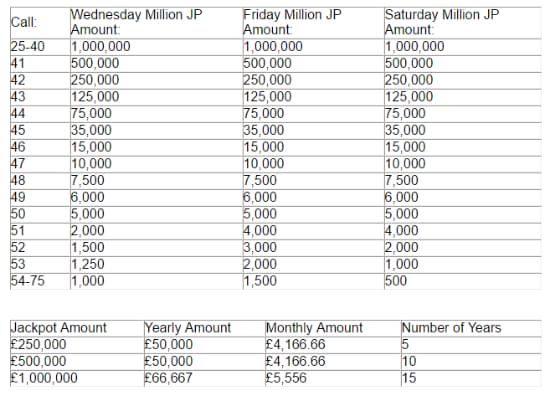
Super Millionaire is a monthly 75 ball game with a card price of £1 and the million pounds is for getting the coverall in 24 calls (and yes, this is the previously mentioned ludicrously unlikely 1 in 25.6 quintillion chance for one card) . The baseline prize is £1000, for 35 or more calls. The chance of winning any prize of more than £1000, if you buy one card to one of these games, is 1 in 196 billion (almost 200 times more unlikely than the David Beckham phone scenario and more than 2000 times more unlikely than winning the Euromillions) and even with 10,000 cards in play the chance of any prize other than the baseline £1000 being won by anyone is approximately 1 in 6 million per game. As this network runs on the Dragonfish software, 888 inserted the same provision for payment by instalments and the same publicity clause as applied to the Dragonfish Million games, but these were later removed.
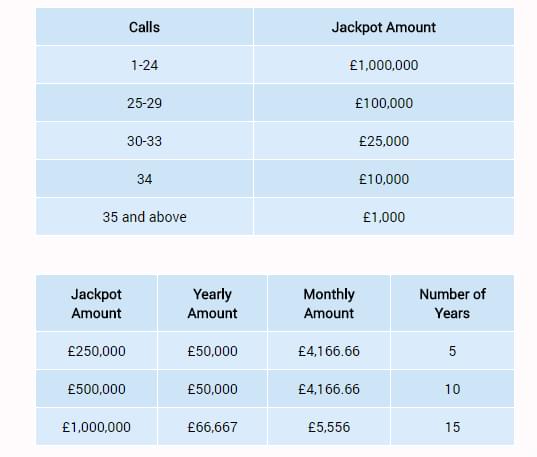
Who Wants To Be A Millionaire is rather different to other sliding jackpots. It is played in a special 90 ball bingo room available at many Virtue Fusion sites (although some very big names do not carry it) with games playing every 5 minutes from mid morning till the wee small hours – so more than 200 games every day. Each of these games offers 1L, 2L and FH prizes which are calculated in the usual way based on ticket sales and do not depend in any way on the number of calls required to bingo (and because the games all have regular prizes they do NOT suffer from the previously described issue with RTP). The number of calls only determines whether someone wins the room jackpot – and this particular room jackpot is a multi-level room jackpot. Basically, it slides – all the way from a million pounds for 17 calls or fewer down to zero for 41 calls or more. As we have already discussed, winning the million pounds is astonishingly unlikely – 1 in 336 trillion if you buy one card in one game. You’d have a better chance of guessing an 8 character password made up of random upper and lower case letters and numbers and getting it right on your first attempt, or tossing a coin 48 times and having it come up heads every time! For one card in one game, the chance of winning even the £500 (for 40 or fewer calls) is worse than one in a million; assuming 2000 cards are in play per game (a generous estimate based on player numbers and card limit in the room) this £500 baseline room jackpot would only be triggered once every 500 games or so. UPDATE: the room has now been removed from all sites.
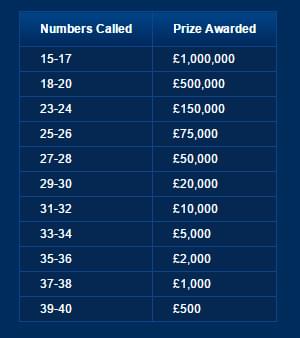
Our handy infographic summarises your (very poor) chances for all three games.
We see that although the Virtue Fusion game was the best value for money as it offered regular prizes as well as the sliding jackpot, by far the “best” chance of winning the million was in one of the Dragonfish games – or would have been if you could actually win the million pounds instead of being drip fed it over 15 years! 1 in 100 million is still very poor indeed, however. Just look at how badly it compares with the lottery!
The Lotto Alternative
- UK Lotto jackpot with 1 x £2 ticket – 1 in 45 million
- UK Lotto Millionaire Raffle (free entry with 1 x £2 Lotto ticket) – estimated 1 in 7.1 million for Wednesday draw and 1 in 14.4 million in Saturday draw
- Euromillions jackpot with 1 x £2.50 ticket – 1 in 140 million
- UK Millionaire Maker (free entry with 1 x £2.50 Euromillions ticket) – estimated 1 in 1.9 million for a regular Tuesday draw and 1 in 2.95 million for a regular Friday draw (because it is a raffle, the odds for a rollover draw are worse because more people buy tickets for those)
The lottery draws are better than the Dragonfish games in all of these ways:
- Lower minimum outlay (£2 for one ticket as opposed to £2.50 for 5 cards to the Saturday Dragonfish game which is the cheapest of the three)
- Similar (Euromillions) or better (UK Lotto) chance of winning
- Much bigger prizes – up to £55 million (UK Lotto) or up to 190 million euros (Euromillions)
- Free entry to a raffle on the side with a much better chance of winning £1 million than in the Dragonfish game (and furthermore the £1 million is actually guaranteed to be won by someone each draw which is not the case in the sliding jackpots).
The Virtue Fusion Million Pound Game
Each ticket in this game had an equal chance of winning and the full house prize was guaranteed to be won, so your chance of winning it was basically the number of tickets you held, divided by the total number of tickets in play for the game. For example, suppose you had 12 tickets and the total number of tickets in play was 600,000, your chance of winning would be 12/600,000 – or 1 in 50,000. Of course this is still 5 times less likely than guessing the PIN number on the first attempt!
The situation was actually a bit more complicated than that. Firstly there were three prizes and they were not completely independent of each other (a ticket that has already won one of the prizes in a 90 ball bingo game has usually marked off more numbers and is therefore in a better position for winning the next prize than most other tickets) and secondly multiple players could win (quite likely given the number of tickets in play) in which case the prize would be split between them.
What was undeniably the case is that if you spent £2 on just ONE ticket to this game, even if there had ended up being more than a million tickets in play the chances of winning the £500,000 – at 1 in a million or worse – would still be VERY much better than your chances of winning the £500,000 in any of the sliding jackpot games and much more on a par with the lottery. The only caveat is that because the prizes in this game were fixed, the RTP of the game would get worse the more tickets were sold (the chance each ticket has of winning goes down but the prize stays the same). What this meant was that if you decided to take a punt on this game, technically the best value for money was to buy one ticket only as the more tickets you (or other players) bought, the lower the chance of winning got for each ticket, and the smaller each ticket’s share of the £100,000 community jackpot got.
So what happened when the game actually ran on 30th December 2016?
- The servers proved more than equal to the task and there were no difficulties getting into the bingo room
- We still have no information about the number of 1L and 1TG/2TG winners
- We believe that the 2L and FH prizes were each shared by two players; 2L was won in 33 calls and FH in 52 calls
- The non-winning tickets’ share of the £100,000 was just under £1.13 per ticket
What can we conclude from this? The total number of non-winning tickets, for a start – 100,000/1.13 which equals 88,496. Without knowing how many 1TG/2TG winners there were – and if you were one of them you can help us work it out by letting us know what your ticket’s share of the 1TG/2TG £100,000 was – we can’t be sure how many tickets there were in play altogether, but it surely must have been under 100,000. Playtech needed to sell 500,000 tickets to cover the guaranteed prize money for the game! Not only was the total number in play less than 20% of that – making the overall RTP for the game a staggering 500% or more – but thousands of those were free tickets given away in promotions by participating bingo sites! We believe that as many as 10,000 tickets were given away free by Gala Bingo alone.
So how come so few tickets were in play for this game, relative to the 888 £200K jackpot games? The FH prize in those games was only one tenth of that on offer in the Playtech game, the card price was the same, and yet they sold on average three times as many tickets!
- The Playtech game was limited to 18 cards per player whereas the 888 games had a much higher maximum of 96 and an average of more than 20 cards per player
- The 888 games were publicised up to three months in advance, but the Playtech game less than a month and at some sites only a week in advance
- The 888 games took place in a dedicated highly visible bingo room whereas the Playtech game took place in the regular network 90 ball room
- Cards for the 888 games could be bought months ahead of time from the dedicated bingo room, whereas cards for the Playtech game could only be bought 6 days in advance by using the regular Playtech advance purchase system (so depending on players having heard about the game and knowing which room at which time to order the tickets for)
- This was all exacerbated by the limited promotion and prebuy periods taking place between Christmas and New Year when many players are busy with friends and family
In many ways the Virtue Fusion bingo platform is a vastly superior product to the Dragonfish/888 platform, but in the case of this type of big game the 888 way of enabling pre-buy by creating a separate bingo room months in advance makes it much easier for players to find out about and buy tickets for the game; it could have been so different with a dedicated room for the game open from the beginning of December, and a higher maximum ticket purchase. The result of all this is that the £1M game has to be a contender for the best promotion ever (for the players, that is) in the entire history of online bingo, especially for players who held free tickets or bought tickets from Sun Bingo where there was an add-on promotion to refund the ticket price of all non-winning tickets. It has been said many times that nothing is sure but death and taxes – well this really was a sure thing and this is how it worked out:
- Buy the maximum of 18 tickets from Sun Bingo – cost £36.
- Chance of winning a big prize, very roughly = 3 x 18/100,000 = approximately 1 in 1850 which is orders of magnitude better than any other chance of winning anything discussed elsewhere in this article.
- Assuming none of the 18 tickets win anything: £36 ticket price refunded plus £20.33 payout for 18 non-winning tickets. Total returned £56.33 – for losing!
We think it extremely unlikely that such a game will ever be run again!
Bingo Millions
Bingo Millions is a new type of game introduced in Spring 2019 at Buzz Bingo. Although it looks and plays very like a sliding jackpot bingo game, it is actually a lottery type game and the number of players has absolutely no bearing on the size of the prizes or the chances of winning one. There are fixed prizes for completing lines and full house in various numbers of calls and these pay out even if other players get there first. The jackpot of £1 million pays out for full house (in the 90 ball version) in 30 or fewer calls and the chance of doing this with one 50p ticket is 1 in 295 million so again, it compares unfavourably with the National Lottery. UPDATE: Bingo Millions was withdrawn in 2022.
So can you really win a million pounds playing online bingo? The answer is that it is theoretically possible, but for such small values of possible that it is very, very unlikely ever actually to happen. The Virtue Fusion game did offer the possibility of one player winning as much as £800,000. For that to happen, the same player would have to have been the sole winner of each line and of full house (not necessarily with the same ticket) but it is no surprise that the game didn’t work out like that.
Arguably the best approach to deciding whether to buy into a sliding jackpot game is just to look at the baseline prize as in most such games that’s all anyone will win – and when you do that, some of the card prices look like very poor value for money indeed.
Thanks to the following for the mathematical input:
Mathematics Stack Exchange math.stackexchange.com
Cross Validated stats.stackexchange.com
Dr Aidan Sims of the University of Wollongong
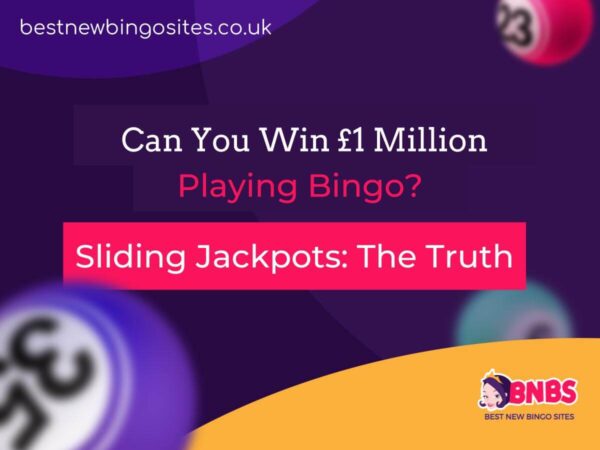
At Best New Bingo Sites all of our reviews are completely honest and written by industry experts. We aim to present all our offers as transparently as possible with a full explanation of the terms and conditions. We receive commission from the sites we feature and this may affect how prominently they appear on our site and their position in our listings.




